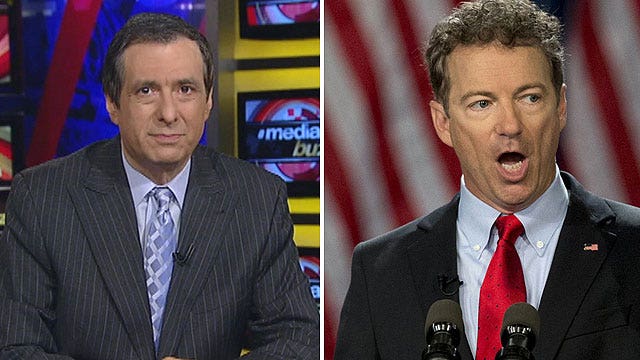Kurtz: Why Rand riles up his rivals
'Media Buzz' host on Republicans becoming ticked at Rand Paul's stance against NSA surveillance programs
In the heat of the moment, Rand Paul went too far.
And he may be the most unpopular Republican in Washington right now.
Which doesn’t necessarily hurt his presidential campaign.
The Kentucky lawmaker single-handedly blocked the Senate from extending the NSA’s bulk records surveillance authority, which ended—at least temporarily—at midnight Sunday.
In lashing out at his detractors, Paul said that some of his critics “secretly want there to be an attack on the U.S. so they can blame me.” That is an outrageous charge, saying that some who disagree with him on the controversial program would prefer to see dead Americans so they can score political points.
Paul tried to backpedal yesterday on Fox, telling Bill Hemmer that “hyperbole can get the better of anyone” and suggesting his comment had been a “mistake,” but repeatedly refusing to retract it.
That was a self-inflicted wound. But here’s the problem I have with some of those who are pummeling Paul. They are charging him with derailing a vital national-security program purely to help his presidential campaign.
It’s a cynical assumption, shared by many in the media, that what Rand Paul is doing is entirely about 2016. Relatively few people in this cynical culture are willing to concede that he believes in the principle he is espousing.
And yet Paul is hardly late to the privacy bandwagon. He has been railing against NSA overreach for years, making it a centerpiece of his campaign. He has come down firmly on the privacy side of the national security debate, risking the wrath of those who believe he is weakening the war on terror.
And that assault has been led by Republicans. Mitch McConnell, who has forged an alliance with his fellow Kentuckian, nonetheless accused him of a “campaign of demagoguery and disinformation.” John McCain said he was engaging in a “fundraising exercise” (and Paul did make a money pitch based on his anti-NSA stance).
The Daily Beast says the senator’s lone-wolf campaign “just made Rand Paul GOP Enemy No. 1.”
A Daily Caller column is headlined “The Fall of Rand Paul?”
“We may look back at Sunday as the moment when Rand Paul went from being a wannabe mainstream Republican contender to a fringe message candidate like his father,” the piece says.
A columnist for The Week at least gave Paul credit for his beliefs, but under the headline “Rand Paul just sacrificed his presidential campaign for his libertarian principles.”
That seems like an overstatement to me, though it’s fair to say that attacking the NSA (and a less aggressive stance on military intervention) could have more appeal in a general election than among the conservative Republicans who turn out in primaries.
But keep in mind that some of these conservative pundits didn’t much like Rand in the first place.
The NSA controversy comes days after Paul infuriated his party by saying that Republican hawks “created” the terror group running roughshod in Iraq and Syria: “ISIS exists and grew stronger because of the hawks in our party who gave arms indiscriminately, and most of those arms were snatched up by ISIS.”
That prompted a scolding by the Wall Street Journal editorial page: “Speaking of gall, and a word of political advice, an aide might want to remind Senator Paul which party’s nomination he is seeking. Republicans who begin their campaigns assailing other Republicans rarely succeed.”
Paul was siding with those who say that George W. Bush’s invasion ultimately led to the creation of ISIS, and not Barack Obama’s withdrawal of troops and initial dismissal of these butchers as a JV squad.
I don’t know whether the pundits are right and Paul is undermining his own presidential campaign. But if that’s the case, at least he’ll go down fighting for what he believes.





